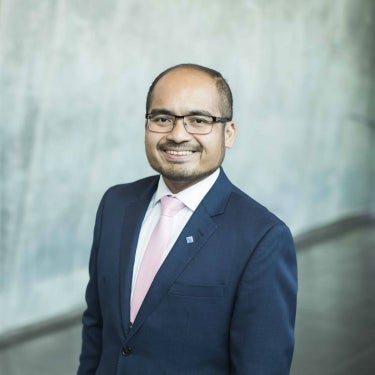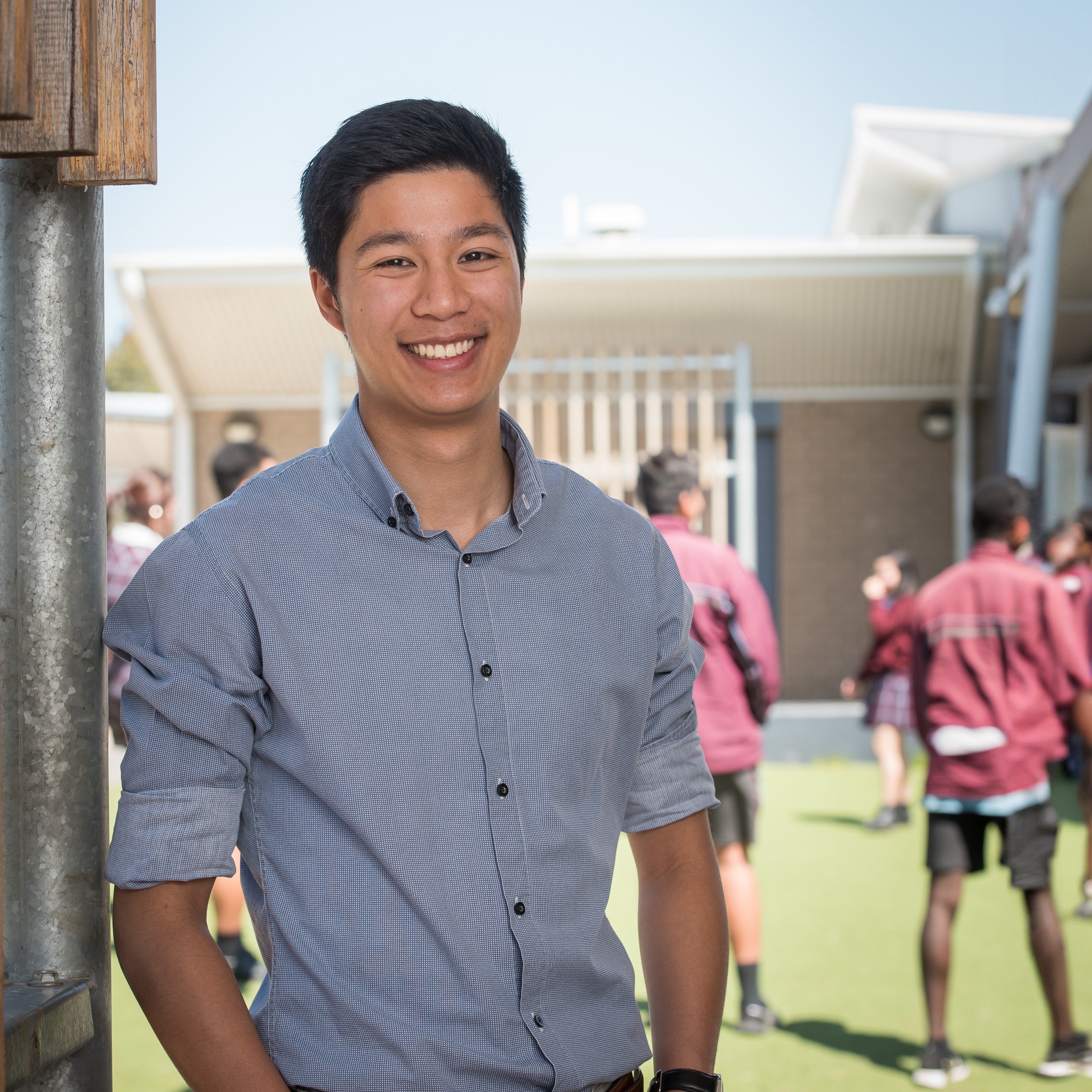Course information
View entry requirements, career options and what’s available to you, through our extensive student support network below.
Entry requirements
- Completion of an Australian bachelors degree (or equivalent).
- Applicants will also be asked to complete an assessment of their non-academic attributes. Applicants with a bachelors degree from countries other than Australia, New Zealand, the United Kingdom, United States of America, Canada or the Republic of Ireland will be required to complete IELTS (or equivalent): Overall 7.0 with Listening 7.5, Reading 6.5, Writing 6.5, Speaking 7.5.
- All students need to pass a CASPer test or VU Non-Academic Attributes (ANAA) interview prior to admission.
- All students need a 3.5 GPA average for entry into the course.
- ADDITIONAL INFORMATION
- Students should note that they will be subject to a Working with Children Check before practice placements, in accordance with Department of Education and Training policy.
- Applicants will be assessed on academic performance.
- Satisfactory achievement of the benchmark for literacy and numeracy is a requirement to graduate from the program.
- The LANTITE must be successfully completed prior to enrolment in ETP5002 or ETP5004 in order to demonstrate that students' literacy and numeracy skills are within that expected of the top 30% of the population in Australia. The LANTITE is a national government requirement for initial teacher education programs.
- LANTITE can be taken at any time prior to enrolment in ETP5002 and ETP5004. The earlier you sit the test, the better so that you can plan your enrolment schedule.
Important: The LANTITE test runs four times per year. Click here for more information on the test including registration, dates, duration and cost.
Career options
Develop a resilient teaching practice that empowers you to teach across diverse primary classrooms. VU Online’s Master of Teaching (Primary Education) will allow you to become a teacher who can apply a variety of approaches to teaching and learning. Gain the skills you need to design and implement a teaching program and inspire students through your teaching practice.
This course meets the Australian Professional Standards for Teachers and is accredited by the Victoria Institute of Teaching (VIT), which means you will be eligible for registration to teach in the whole of Australia upon graduation.
Student support
VU Online provides you with the support you need, when you need it, during your course. Our support network has a single focus on ensuring you are entirely supported to succeed in your studies.
Our highly experienced academics are responsive and accessible and understand how to deliver a quality online learning experience. You will also be introduced to your very own Student Success Advisor, who provides motivation and one-on-one personalised assistance with non-academic matters throughout your course.
You’ll experience the support of your community through chat, virtual seminars and discussion board activity. Remember, your support network is only a phone call and email away.
Fees and FEE-Help
Our Master of Teaching (Primary Education) costs $2,950 - $5,900 per unit. Certain units are double weighted and prices have been adjusted accordingly. The total cost for all 14 units is $47,200.
FEE-HELP loans are available to assist eligible full-fee paying students with the cost of a university course. This Government loan scheme helps to pay for all or part of their tuition.
*2026 student fees are shown and are subject to change.
For more information on fees and student support, download a brochure.
How online study works
Studying with VU Online means that you can undertake postgraduate study without having to attend on-campus classes. This makes it easy to fit study around existing commitments including work and family. You will be able to access your coursework, resources, assignment details and individual feedback from facilitators, all from your online learning environment, VU Collaborate.
Chat with fellow students, compare research notes and collaborate on group tasks – it’s all possible with our seamless, community-focused platform.
With VU Online, you will study just one unit at a time under the award-winning VU Block Model®. Learn about our postgraduate online Block Model with this YouTube video.
You will receive support from our responsive academics and facilitators, as well as your dedicated Student Success Advisor throughout your study.
How to apply
VU Online has simplified the application process, involving just three key steps.
- Speak to one of our Student Enrolment Advisors, who will help you determine your eligibility for the program and whether it suits your career goals. Our advisor will keep you informed of all the application requirements and what to expect during the process. They can also suggest flexible study plans for your circumstances.
- Begin your online application and submit the required documentation. This may include a copy of your CV and academic transcript.
- Upon completing your application, you will receive a confirmation email or an email letting you know if you need to provide any additional information.
What you'll study
Approaches to Teaching and Learning - EED7002
In this unit preservice teachers orientate themselves to the teaching profession. Preservice teachers will develop in-depth knowledge of schooling and teaching within the context of professional guidelines and ethical codes of conduct. Preservice teachers explore the philosophy and possibilities of education including student learning. In addition, they investigate effective classroom management and innovative curriculum design and lesson planning.
Language and Literacy in the Primary Years 1 - ETP5001
This unit of study focuses on the development of language and literacy in the Lower Primary context. Preservice teachers will develop a strong disciplinary understanding of how to teach across the three strands of language, literacy and literature as articulated in the Primary English Curriculum. The unit will develop pedagogical content knowledge in the teaching of reading, writing, speaking and listening. The unit also requires students to reflect on their personal literacy skills and knowledge and make connections to professional practice. Students will be introduced to the theoretical and philosophical underpinnings of how to teach literacy and language in a Lower Primary classroom. Practical approaches to the teaching of grammar, phonics, comprehension and literature will involve the study of English language conventions and structures.
Teaching and Learning Primary Mathematics 1 - ETP5003
Preservice teachers are introduced to effective mathematical teaching approaches, models and strategies used by primary teachers to enhance student learning of mathematical content, concepts and reasoning. The mathematical content focus in this unit relates to Measurement and Geometry, Statistics and Probability. Preservice teachers reflect on their mathematics and numeracy knowledge to develop personal levels of proficiency when planning, structuring and implementing learning programs that correspond with students' diverse learning needs and abilities and curriculum content strands. The unit also provides a foundation to a range of pedagogical approaches to teaching mathematics. This will include taking into account the needs of different learners from a range of cultural backgrounds. Students will have the opportunity to engage in workshops, discussions and activities and receive feedback through informal and formal assessments.
Science in Primary Education - ETP5007
The learning in this unit focuses on enhancement of students’ scientific literacy, as well as developing skills and knowledge required for teaching the primary science curriculum confidently. Throughout this unit students are provided with many opportunities to develop their understanding regarding core scientific ideas, the practices that scientists use in creating knowledge about the world, and appreciation of the role of science in everyday life. They develop pedagogical knowledge of primary science education theories, and teaching and learning models. Students work collaboratively to develop their capacities, knowledge and skills in designing science education units, and learning plans that enable primary students to engage with science in the world around them.
Curriculum and Multi-modal Learning - EED5102
Preservice teachers will study and experience the philosophy, theories and possibilities of multi-modal teaching and learning. The unit covers classroom arrangements, classroom unit and lesson planning and implementation, and how curriculum, pedagogy and assessment strategies are enacted and reported to support students' needs. Additional aspects will include legal and safety concerns of teaching and student welfare issues. Continuing application of the Praxis Inquiry Protocol will support investigations and theorising of curriculum, teaching, learning, social justice and research. Questions involving key features of classroom situations will be explored such as how new learning is supported, how are new student understandings formed and how do we know what has been learned? Multi-modal learning will be explored to develop an understanding of different teaching practices support students' learning and understanding in key areas such as literacy and numeracy. This will involve the application of information technology into teaching that includes such approaches as, inquiry learning, personal learning plans, experiential learning and cooperative learning.
Primary Health and Physical Education - ETP5005
This unit provides preservice teachers with pedagogical content knowledge and health literacy skills to facilitate primary school students’ development of knowledge, skills and behaviours necessary for the pursuit of lifelong physical activity, and strengthening of their physical, mental and social health and wellbeing. Preservice teachers will investigate trends and approaches to health and physical education and personal and social learning. They will become aware of the significance of a ‘strengths-based approach’ in health and physical education theory and practice. The unit content will focus on understanding the current curriculum for Health and Physical Education and Personal and Social Capability in Victorian Primary Schools. This unit will focus on strengths-based pedagogy and assessment, how these is enacted in schools and classrooms, and whole-school approaches for promoting health and wellbeing.
Humanities in Primary Education - ETP5006
Preservice teachers develop an understanding of curriculum and pedagogy required for the teaching of the primary humanities curriculum. They investigate, analyse and evaluate a range of approaches to the teaching of humanities to enable them to design and implement teaching and learning strategies that promote knowledge and skills required by students for life-long learning, social development and active and informed citizenship. Preservice teachers develop their teaching practice in the areas of History, Geography, Economics and Business, Civics and Citizenship together with cross curriculum priorities relating to Aboriginal and Torres Strait cultures and engagement with the Asian-Pacific region. They develop knowledge, capacities and multiliteracy skills appropriate to twenty-first century learning and teaching contexts.
The Arts and Design in Primary Education - ETP5008
Preservice teachers are introduced to theoretical, philosophical, pragmatic and practical perspectives related to contemporary arts and design education for primary school students. These perspectives include an introduction to arts and design curriculum, planning and pedagogies that promote quality learning and teaching of the arts and design, with a focus on the areas of music, drama, dance, visual arts and media arts. Preservice teachers also consider how these arts and design areas can productively intersect with other subject areas for effective teaching and learning.
Indigenous Perspectives in Learning and Teaching - AEK7001
This unit connects with the unit learning outcomes of articulating and embodying the ideologies, epistemologies and cosmologies of socially-just education through critically reflective and reflexive teaching, Indigenous-led learning, equity and access, as well as critically applying knowledge of educational issues to improve classroom practice and strengthen students' relations with their local community. The overall goal of this unit is to embed Aboriginal and Torres Strait Islander peoples, places, and positionalities in compulsory school curriculum content and pedagogy through the acknowledgement of the past and present and future aspirations held by Indigenous peoples, particularly the First Nations people of Australia, and their communities of belonging, in order to value the wealth and diversity of our shared future.
This unit aims to develop critical understandings of curriculum design and content; ongoing connections of people to place and space; theoretical constructs including post-colonialism and decolonisation; engagement beyond dominant culture discourses, descriptions and solutions; key issues of self-determination and sovereignty; culturally appropriate pedagogical and curriculum materials; privileging of Indigenous and post-colonial ways of knowing, being and doing education in the 21st Century; challenges in addressing systemic change required to meet the needs of Indigenous students and Indigenous educators; strategies for inclusion that value Aboriginal and Torres Strait Islander students in school; and understanding how to challenge the colonial standpoints that hinder equitable outcomes for Indigenous students.
Language and Literacy in the Primary Years 2 - ETP5002
In this unit of study preservice teachers will explore multidimensional aspects of literacy education and the acquisition of literacy skills by critically investigating the organisation of print literary and digital texts. The unit aims to develop a pedagogical understanding of how to teach: compositional techniques, forms of print based and digital representation for receiving and communicating meaning to different audiences and for differing purposes and contexts. Preservice teachers will be guided to build their repertoire of knowledge of literacy pedagogies and concepts to enable them to integrate theory and practice when planning to teach literacy across the curriculum.
Through the unit preservice teachers will investigate models for developing and responding to students speaking, listening, reading, viewing, writing and creating. Preservice teachers will also investigate curriculum and assessment rationale to include informal, formal diagnostic, formative, and summative approaches to assessing student learning from Primary years three to six. Preservice teachers will be introduced to theoretical models of language and literacy to appraise literacy/language learning in the middle years of schooling when responding to diverse learners’ needs and abilities.
Teaching and Learning Primary Mathematics 2 - ETP5004
Preservice teachers build their technological and content pedagogical knowledge and skills in the strand of Number of Algebra in the Victorian Curriculum. Preservice teachers advance their teaching knowledge and practice by engaging in the latest advances in mathematics educational and technological research and practice. They critically evaluate the use of AI in primary mathematics teaching and learning activities, and in student learning management systems including Compass and SEQTA. Preservice teachers review national and international mathematics curricula, teaching practice and assessment. They analyse and respond to various types of student data used in primary mathematics settings and explore methods of promoting student agency and authentic learning experiences. Preservice teachers design an innovative, differentiated and enriched unit of work encompassing assessment and use of connected concepts and problem solving strategies to deepen student learning of mathematics. Preservice teachers explore the proficiency strands.
Research Methods in Education - EED7001
Research is an integral element of education. The intention of this unit is to provide students, both practitioner researchers and those who wish to advance in their trajectory as researchers with a conceptual and critical overview of educational research methodologies and methods. Students will familiarise themselves with methodological literature, explore current literature related to their chosen area of inquiry and experience developing a research proposal. Students are advised to complete this unit preceding the minor thesis, capstone or curriculum specialisation.
Engaging with the Profession – EED7004*
This final unit in the course enables postgraduate students to encapsulate their work in the Master of Teaching (EMPE) course. The unit enables students to work with lecturers, colleagues, principals, other school leaders and teachers in meeting National Standards in order to comply with registration requirements. Students will undertake a critical overview of teachers' professional roles and responsibilities and will develop an awareness of the organisational and legal conditions of teachers' work, informing relationships with and teaching students, planning and managing curriculum and pedagogy, working with colleagues in leadership teams, and engaging with the school and wider community.
Students will engage in professional experience in Primary school, where they will refine their ability to organise content into effective teaching sequences, set achievable goals for students and demonstrate their ability to effectively use a range of resources. Students will also demonstrate the capacity to gather and interpret student assessment data to evaluate student learning and modify teaching practice.
This unit connects with the course intentions of guaranteeing that graduate teachers have deep and connected understandings of the content they are teaching and the pedagogical approaches for implementing the curriculum, in addition to engaging professionally with colleagues, parents, carers and the community. This unit also connects to the course learning outcomes of displaying competence and sophistication in a range of oral and written communication techniques, including in the use of Information and Communication Technologies, to engage and connect with students, their parents/carers and the wider community, as well as recognition of the importance of fostering students' creative skills, and problem solving strategies to prepare them to confront and pro-actively solve 21st Century challenges. Students will apply their critical understandings of the changing nature of society to the development of educational policies, curriculum, pedagogy and assessment processes relevant to school students' needs.
Students will develop skills needed to seek employment, including preparing job applications, responding to selection criteria, interview techniques and awareness of professional networks and professional learning opportunities.
*This unit is double-weighted. Unit fees will be adjusted accordingly.
Primary Specialisation Capstone - EED7005*
Preservice teachers will deepen their professional knowledge, skills and abilities to teach in an approved primary school specialisation. In the selected specialisation area preservice teachers undertake in-depth studies and research into primary curriculum, pedagogy and assessment. They research aspects of twenty first century teaching and learning in rapidly changing global, social, economic, environmental and technological contexts that inform content, pedagogy, curriculum and assessment of students' learning, skills, capacities and cultural understandings. Preservice teachers investigate the research-teaching-practice triangle in learning about the importance of research for teacher preparation and professional practice aimed at improving school students' learning. Students will be involved in a 10 day teaching experience during which time they will develop and apply ethically appropriate methods for collecting data through classroom observations, teacher feedback, assessment of students' learning and knowledge. They will collate and analyse data and critically evaluate their own teaching and further build their professional competence, creativity, critical analysis, and problem solving ability.
*This unit is double-weighted. Unit fees will be adjusted accordingly.
Online study
This degree is offered through VU Online’s postgraduate Block Model, winner of consecutive LearnX Live! Awards.
Instead of taking two or three units a semester, you will study one unit at a time in six study periods per year. This offers you more flexibility than traditional on-campus degrees and the opportunity to immerse yourself in your study.
At VU Online, we take a personalised 1:1 approach to online learning, which makes learning with us highly interactive and supported.
Frequently asked questions
How many placements are there? Does it depend on the location?
Is the IELTS exam mandatory?
If you have a degree from another country not listed above, you will need to provide an IELTS score, or other English proficiency test such as the TOEFL or PTE, as part of your application.
If you would like personalised advice, please reach out to our Student Enrolment Advisors.
Will I be able to teach in other states after I graduate from VU Online?
What is the CASPer test?
What is the Non-Academic Attributes (ANAA)?
What does the ANAA interview involve?
What can I do with a Master of Teaching (Primary Education) at VU Online?
What is LANTITE?
The test consists of two components - literacy and numeracy - each two hours in duration and with a short tutorial at the beginning. The registration process before each test component will take about 30 minutes.
Click here for more information on the test including registration, dates, duration and cost.
Do I need to prepare for LANTITE?
What happens if I am unsuccessful in my LANTITE?
Can you do a Master of Teaching online?
What is the difference between a Master of Teaching and a Master of Education?










